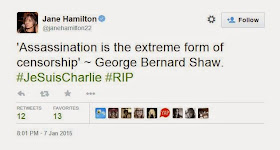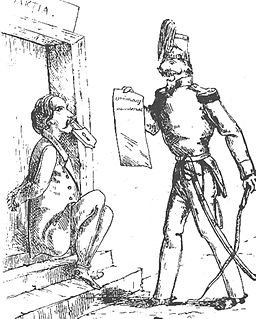After the recent terrorist attack against the French magazine Charlie Hebdo, many people have shown their support for the victims and the freedom of speech they stood for on Twitter. The hashtag chosen for the occasion is #JeSuisCharlie. Many of the messages of condolence and support have included famous quotations in defense of free speech, and against censorship and violence. Among these, you guessed it, Shaw is a favourite choice with words like these:
I would like to offer readers a chance to source this quotation when they use it in social media. In July 1909, a Joint-Select Committee held several hearings to discuss the issue of the censorship of plays in Britain. Bernard Shaw prepared a written memorandum to be read before the Committee - published privately under the title The Statement of the Evidence in Chief of George Bernard Shaw before the Joint-Committee on Stage Plays (Censorship and Theatre Licensing). Although Shaw was not allowed to read this text at the hearing, nor was the memorandum included in the evidence presented before the Committee, the text survived and it has been recently digitized by the Internet Archive.
The relevant section of the memorandum here begins on page 15 under the heading "The Limits to Toleration." In it, Shaw argues that there must be certain limits to what we tolerate in the name of liberty. For example,
"though we tolerate, and rightly tolerate, the propaganda of Anarchism as a political theory which embraces all that is valuable in the doctrine of Laisser-Faire and the method of Free Trade as well as all that is shocking in the views of Bakounine, we clearly cannot, or at all events will not, tolerate assassination of rulers on the ground that it is "propaganda by deed'' or sociological experiment."
Then, Shaw goes on to dismantle - in a classic example of reductio ad absurdum - some of the arguments in favor of censorship. For, if "assassination is the extreme form of censorship," a play "inciting to such an assassination" must be banned. Therefore, Julius Caesar, a play that "unquestionably vindicates and ennobles a conspirator" should not be licensed.
And now, the grand finale (original spelling):
"The very people who would have scouted the notion of prohibiting the performances of Julius Caesar at His Majesty's Theatre in London last year, might now entertain very seriously a proposal to exclude Indians from them, and to suppress the play completely in Calcutta and Dublin; for if the assassin of Caesar was a hero, why not the assassins of Lord Frederick Cavendish, Presidents Lincoln and McKinley, and Sir Curzon Wyllie? Here is a strong case for some constitutional means of preventing the performance of a play. True, it is an equally strong case for preventing the circulation of the Bible, which was always in the hands of our regicides; but as the Roman Catholic Church does not hesitate to accept that consequence of the censorial principle, it does not invalidate the argument."
It seems to me that if people read Shaw more, there would be fewer individuals willing to kill for religious ideals.
As an addendum to this post, it was brought to my attention - thanks to a generous reminder by Bernard Dukore, perhaps the greatest authority on Shaw quotations - that this memorandum on censorship was later used by Shaw to write the preface to The Shewing-Up of Blanco Posnet. The quotation is also found there.


No comments:
Post a Comment